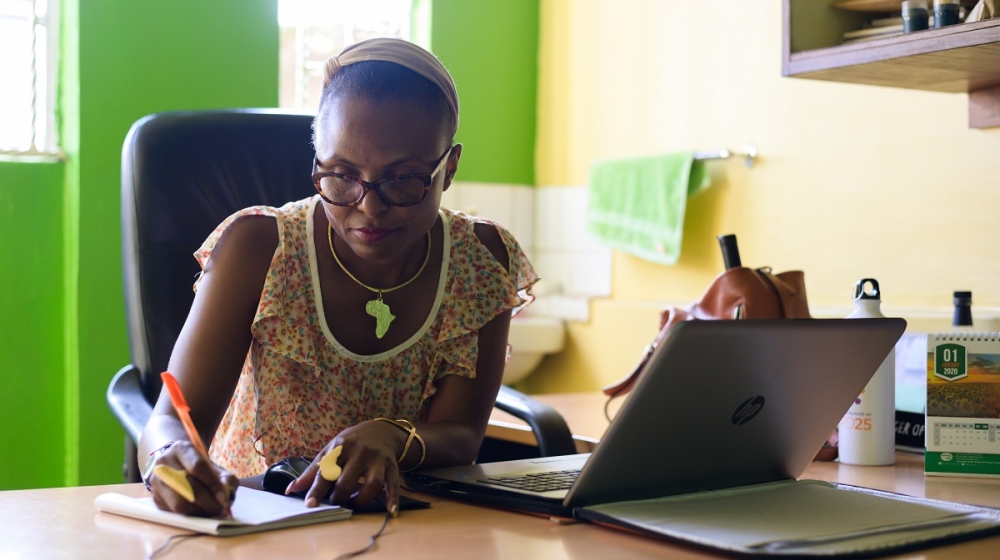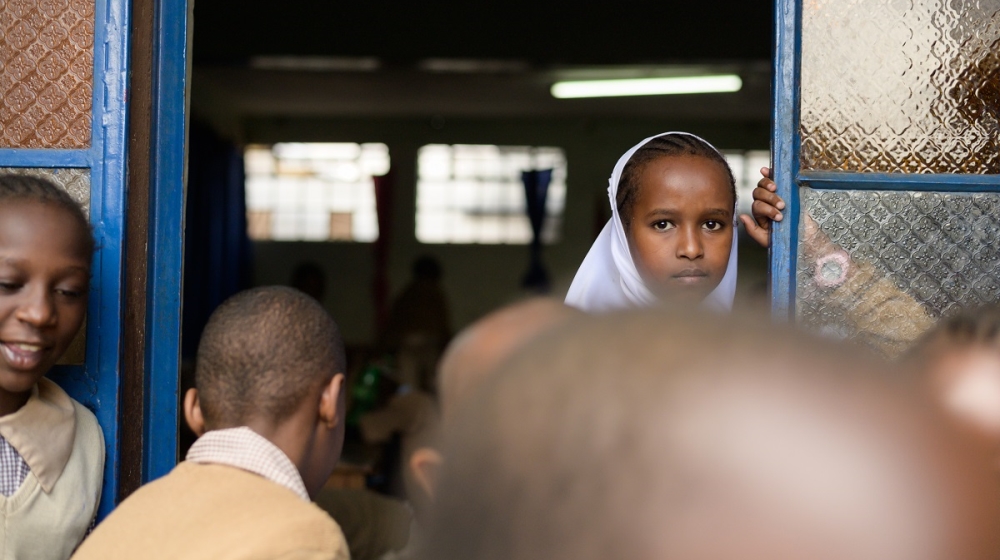‘I wish I was a boy’: The Kenyan girls fighting period poverty
In Kenya, one million girls miss school each month because they cannot afford sanitary pads, while some share used ones.

Nairobi, Kenya – For Mary Asigi, a 17-year-old pupil at Damascus primary school in the slums of Dandora on the outskirts of Nairobi, it is usual to miss a few days of school each month because she has no sanitary towels to use when she has her period.
“This affects my performance in class,” she says.
Keep reading
list of 4 itemsUS university ties to weapons contractors under scrutiny amid war in Gaza
UC Berkeley chancellor speaks out about ‘Gaza brutality’
Are US graduation ceremonies the latest battleground for Gaza protests?
Like many others in her community, Mary’s education has already been disrupted by poverty, which is why she is still at primary school at the age of 17. Many children here drop out of school intermittently, for one or two years at a time, because their families cannot afford to send them. According to UNICEF, more than 1.2 million primary school-age children in Kenya, which has a population of 50 million, do not attend school at all.
Period poverty – being unable to work or attend school because of lack of funds for sanitary products – makes life even harder for girls.
Mary has tried to find solutions, but improvising is not always ideal.
“When I was 15 in class 6, I used to share used pads with fellow classmates before my class teacher warned against it because it was unhygienic,” she says. Sharing pads is particularly dangerous – research shows that some 12 percent of people living in the slums on the outskirts of Nairobi have HIV, compared with about 5 percent of the general population.
Not only that, but girls going to school while they have their periods risk severe teasing and taunting by the boys, Mary explains.
Like the other girls in her community, Mary faces a stark choice – risk her health or risk her education.
‘The boys mock them’
In an area where a packet of sanitary pads costs $1, and the average family has to manage on less than that per day, poverty means access to sanitary products is near-impossible for the majority of girls, particularly if they have to travel from remote rural areas to buy them in towns.
Mary’s school is in the Korogocho slum in Dandora, which is situated in Nairobi’s Eastlands. Open drains and sewers are dotted about the settlement. Damascus primary school is in a two-storey building with overcrowded classrooms. The ground floor is used by children in the lower primary, while the older students take their classes on the upper floor. Hundreds of pupils play in tight spaces and in the corridors between classrooms.

Regina Nthambi, 16, a student of class 7 at the same school, passes for privileged among her fellow female classmates. Her father, a tailor who barely makes ends meet, tries to buy her sanitary pads every month. When there is no money to buy them he improvises with scraps from discarded pieces of clothing at his shop.
“I share with my friends,” says Regina as she nervously chews on her nails. “They are new and unused. Our teacher warned us against sharing used pads because it’s unhealthy. Some of my classmates get their periods in class and the boys mock them, which is a reason some students do not attend class during this time.”
Lack of sanitary pads has led to an estimated one million girls missing school every month.
Research by Menstrual Hygiene Day, a global advocacy platform for non-profit organisations and government agencies to promote menstrual health, shows that 65 percent of women and girls in Kenya are unable to afford sanitary pads.
According to research by Kenya’s Ministry of Education, girls lose on average four school days every month, which translates to two weeks of learning each term. Over four years of high school, they lose on average 165 learning days.
Failure to change
The Kenyan government has taken steps to counter this problem. Ten years ago, Kenya became the first country in the world to drop taxes on imports of sanitary products for women and girls. The government also committed $3m to help distribute sanitary pads to low-income communities.
This is despite a government-funded programme, which was implemented in April 2018, to distribute 140 million free sanitary pads to 4.2 million girls across the country. The programme, which distributed supplies directly to schools, ran for four months before it fizzled out as supplies ran out and girls started missing classes again.
There were several reasons for the failure of the programme. In some cases, distributors appointed by the government failed to deliver and new contractors had to be found, causing a delay. In others, too few supplies were delivered, meaning that girls received fewer pads than they needed, and some went without any at all. Yet another reason was corruption.
In one case, Nairobi News reported that a supply of 300,000 sanitary towels intended for schools had been stolen and repackaged, with the intention of reselling them.

“The cartels in this country are hijacking government projects,” says Emmie Eronanga, director of the Miss Koch women’s advocacy NGO, which is based in the low-income neighbourhood of Kariobangi North, close to Korogocho. “And now most girls in the slums are at risk of not going to school or skipping classes every month for a couple of days.”
Miss Koch aims to promote awareness of women’s issues in Kenya and provides free pads to young girls in the slums when it can. In reality, the NGO’s funds only stretch to helping a few of the girls at a few of the schools each month, including the Damascus primary school.
“I have just bought some sanitary towels myself for the daughter of one of the women I train so she can return to school,” she explains.
At her third-floor office, Eronanga and her team provide reproductive health education services with the aim of reducing the stigma and shame felt by girls about their periods and their bodies in general.
Under the government distribution scheme, no sanitary pads were ever received at all at the Damascus primary school in Korogocho. “The government gave us a framework sometime back to provide and distribute pads but they never implemented anything,” says Eronanga.
The team’s small budget is partially funded by organisations from the United Kingdom, such as Faith Charity, which send cash to enable 150 girls to buy sanitary pads each year. But this help is just a drop in the ocean considering on average each school in Kenya is attended by between 400 and 500 girls.
Two years ago Kenya’s President, Uhuru Kenyatta, assented to the Basic Education Amendment Act that would have seen girls who have reached puberty across the country provided with free, quality sanitary towels in sufficient quantities, all funded by the state. But so far little has happened on the ground.

‘They can’t even afford food for their families’
Esther Moraa, 25, a social sciences teacher at Damascus primary, says poverty in the slum is the real problem.
“All parents here are very poor. They can’t even afford to buy food for their families. Why should you even talk of sanitary pads?” she says as she points in the direction of the nearby Dandora rubbish site which serves as the city’s largest dump.
“Only NGOs distribute pads once in a while despite the fact some girls start menstruating early,” she says. “I teach them how to alter old clothes to use as pads. As a teacher, sometimes I am forced to go into my pocket to buy a box or two for the girls.”
Mary, who lives with her single mother and is the youngest of three sisters, dreams of a career with the Kenyan navy but is not sure she will make the cut if she keeps missing classes.
Still, she is determined to overcome this obstacle.
“I know girls in my class who have left school for good because of pads. Nowadays I use old clothes because my mother doesn’t have the money and I don’t want to skip classes.”

Yvonne Waweru is a local member of parliament at the County Assembly of Kiambu who is calling for greater transparency and accountability when it comes to aid programmes like the government’s programme to distribute sanitary pads.
In order to overcome corruption, she says: “The government should invest more funds in monitoring and surveillance to ensure that sanitary towels reach those who need them the most.
“Social empowerment for girls plays a central role in eradicating poverty and the wellbeing of our communities. Denial of adequate social protection leaves girls vulnerable to long-term poverty and the opportunity to further their education.”
In the meantime, back at the Damascus primary school, Mary sits on a school desk. “I wish I could be a boy,” she says. “I’d have never missed a class or school. I could play freely with my friends like boys in my class do and do well in the exams to join the navy thereafter, so that I can help my mother and my country.”